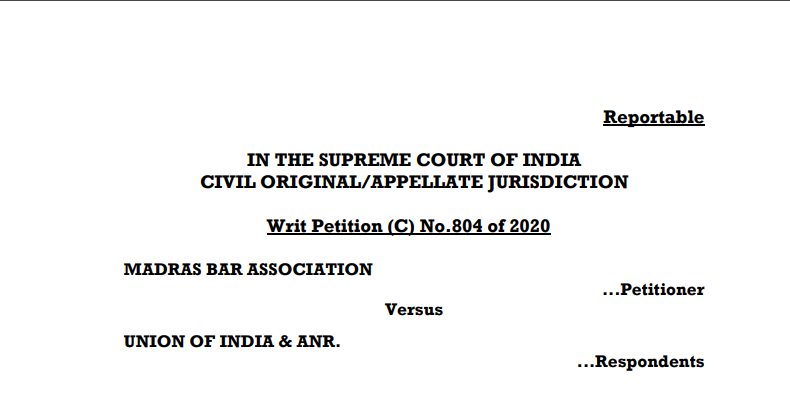Supreme Court in the case of Madras Bar Association Versus Union of India
Case Covered:
Madras Bar Association
Versus
Union of India
Facts of the Case:
This Court is once again, within the span of a year, called upon to decide the constitutionality of various provisions concerning the selection, appointment, tenure, conditions of service, and ancillary matters relating to various tribunals, 19 in number, which act in aid of the judicial branch. That the judicial system and this Court, in particular, has to live these déjà vu moments, time and again (exemplified by no less than four constitution bench judgments) in the last 8 years, speaks profound volumes about the constancy of other branches of governance, in their insistence regarding these issues. At the heart of this, however, stake far greater: the guarantee of the rule of law to each citizen of the country, with the concomitant guarantee of equal protection of the law. This judgment is to be read as a sequel, and together with the decision of the Constitution Bench in Rojer Mathew v. South Indian Bank Limited.
The core controversy arising for this Court’s consideration is the constitutional validity of the “Tribunal, Appellate Tribunal, and other Authorities [Qualification, Experience and Other Conditions of Service of Members] Rules, 2020” (hereinafter referred to as “the 2020 Rules”)
Observations:
As we have held that the 2020 Rules are not retrospective, the point that remains to be determined is the applicable Rules for appointments that were made prior to the 2020 Rules. The appointments made during the pendency of Rojer Mathew (supra) on the date of interim orders passed therein and appointments made after the judgment of Rojer Mathew (supra), like the appointments made prior to the 2017 Rules are, no doubt, to be governed by the then-existing parent Acts and Rules. In view of the interim orders passed by this Court in Rojer Mathew (supra), appointments made during the pendency of the case in this Court are also to be governed by the parent Acts and Rules and the clarifications issued by this Court in Rojer Mathew (supra). According to paragraph 224 of the judgment in Rojer Mathew (supra), the appointments to the Tribunals were directed to be in terms of the respective Acts and Rules which governed appointments to Tribunals prior to the enactment of the Finance Act, 2017. For the purpose of clarity, we hold that all appointments made prior to the 2020 Rules which came into force on 12.02.2020 shall be governed by the parent Acts and Rules. Any appointment made after the 2020 Rules have come into force shall be in accordance with the 2020 Rules subject to the modifications directed in the preceding paragraphs of this judgment.
The Decision of the Court:
For the aforementioned reasons, the Writ Petitions, Transfer Petitions, Civil Appeals, and all the applications are disposed of.
Epilogue
Dispensation of justice by the Tribunals can be effective only when they function independently of any executive control: this renders them credible and generates public confidence. We have noticed a disturbing trend of the Government not implementing the directions issued by this Court. To ensure that the Tribunals should not function as another department under the control of the executive, repeated directions have been issued which have gone unheeded forcing the Petitioner to approach this Court time and again. It is high time that we put an end to this practice. Rules are framed which are completely contrary to the directions issued by this Court. Upon the tribunals has devolved the task of marking boundaries of what is legally permissible and feasible (as opposed to what is not lawful and is indefensible) conduct, in a normative sense guiding future behavior of those subject to the jurisdictions of such tribunals. This task is rendered even more crucial, given that appeals against their decisions lie directly to the Supreme Court, and public law intervention on the merits of such decisions is all but excluded. Also, these tribunals are expected to be consistent, and therefore, adhere to their precedents, inasmuch as they oversee regulatory behavior in several key areas of the economy. Therefore, it is crucial that these tribunals are run by a robust mix of experts, i.e. those with experience in policy in the relevant field, and those with judicial or legal experience and competence in such fields. The functioning or non-functioning of any of these tribunals due to lack of competence or understanding has a direct adverse impact on those who expect effective and swift justice from them. The resultant fallout is invariably an increased docket load, especially by recourse to Article 226 of the Constitution of India. These aspects are highlighted once again to stress that these tribunals do not function in isolation, but are a part of the larger scheme of justice dispensation envisioned by the Constitution and have to function independently, and effectively, to live up to their mandate. The involvement of this Court, in the series of decisions, rendered by no less than six Constitution Benches, underscores the importance of this aspect. The role of both the courts as upholders of judicial independence, and the executive as the policy-making and implementing limb of governance, is to be concordat and collaborative. This Court expects that the present directions are adhered to and implemented so that future litigation is avoided.
The Government is, accordingly, directed to strictly adhere to the directions given above and not force the Petitioner-Madras Bar Association, which has been relentless in its efforts to ensure judicial independence of the Tribunals, to knock the doors of this Court again.
Read & Download the full Decision in pdf:
If you already have a premium membership, Sign In.
 ConsultEase Administrator
ConsultEase Administrator
Consultant
Faridabad, India
As a Consultease Administrator, I'm responsible for the smooth administration of our portal. Reach out to me in case you need help.













